They must return home, but burned Ukrainian children found new friends and support
Reporter Kristen Jordan Shamus and visual journalist Mandi Wright of the Free Press, part of the USA TODAY Network, visited Poland in May, near the border with Ukraine. They followed a group of U.S. doctors who traveled to Poland to treat Ukrainian children with burns and congenital abnormalities, the first such trip since Russia invaded Ukraine in February 2022. The doctors, from Michigan, Texas, Massachusetts and Missouri, operated on 20 children during their visit. Shamus and Wright had extraordinary access to the doctors and families, and in the hospital. To contribute to Doctors Collaborating to Help Children, go to dctohc.org/donations.
LECZNA, Poland — They began as strangers from such disparate parts of Ukraine as Mykolaiv in the south, Kharkiv in the east, Kyiv in the central region and Lviv in the west.
They shared a national identity and the trauma of war, along with one more commonality: children with untreated medical needs.
Together, these mostly mother-child pairs caravaned by bus and by train across a homeland pocked by shelling and missile attacks. The group picked up more and more women and children as they traveled over the border into Poland, where U.S. doctors waited.
There, the kids underwent complex plastic and reconstructive surgery — procedures that aren’t available in Ukraine because of the ongoing Russian invasion — for treatment of a bomb blast injury, to ease pain and deformities caused by constricting burn scars, and to repair congenital anomalies.
They all stayed at the Secession Hotel in this small Polish town, where, for more than a week in mid-May, they shared meals and laughter, doubts and fears, anguish and joy as they waited for each child’s turn for surgery at the Independent Public Health Care Facility, one of the largest burn treatment centers in Poland.
The women became fast friends, leaning on one another.
The children did, too.
More: Ukrainian doctors working in extreme conditions count on US peers' help
'Their mood improved every minute'
“They came here with visible signs of tension, increased anxiety and depressed mood,” said Dr. Nataliya Yevchenko, a Ukrainian psychiatrist who traveled with the families and stayed with them to offer mental health support.
“Not only were they leaving a country at war and had certain distress related with that aspect of their life — worried parents and relatives, bomb threats, moving away, e-schooling, limited contact with other children from their respective age groups — but they also had additional worries related to the surgery and treatment.
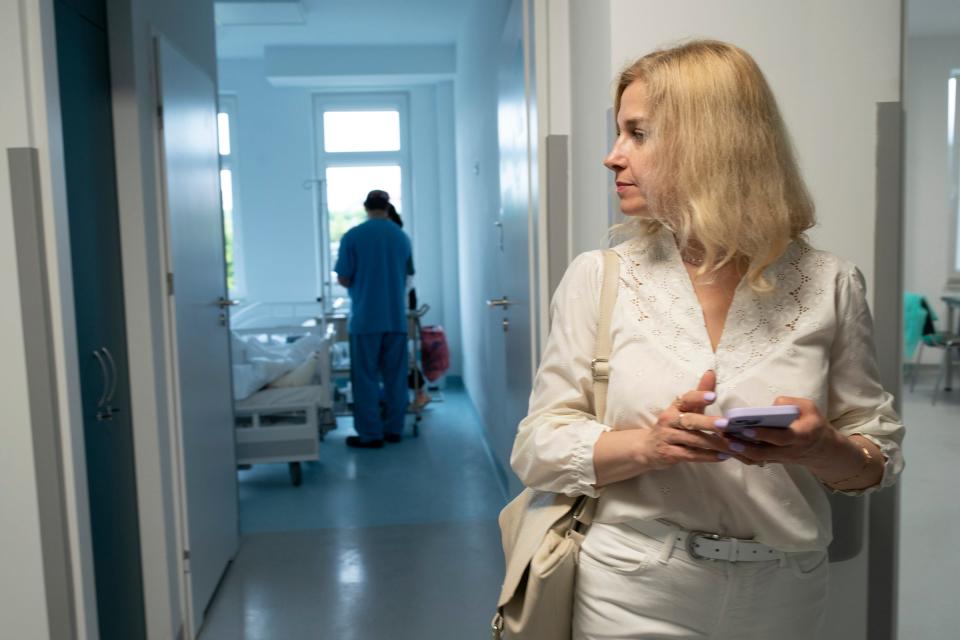
“While staying here, in comfortable conditions in Poland, their mood improved with every minute. They were relaxing, calming down, started to play games with each other. They realized that they came as a group sharing similar experiences and problems — war, illness, upcoming surgery. They had a chance to make friends in an environment where people genuinely understood each other.”
The environment became almost like a burn camp for Ukrainian kids and their moms, where they could bond, said said Dr. Gennadiy Fuzaylov, a Boston-based physician and philanthropist who organized the humanitarian medical mission through the nonprofit he founded, Doctors Collaborating to Help Children.
More: US doctors travel to edge of war zone to care for burned Ukrainian children
“I think we impacted these kids plus their parents,” said Fuzaylov, who has planned more than a dozen similar trips to Ukraine to provide medical help to burned children prior to the war. “Some of the parents sent me text messages and said that was best time in their lives.”
Winning a teenager's trust
Maksim Kondrashov, 13, of Kryvyi Rih, Ukraine, pulled up the hood of his sweatshirt and barely spoke when American doctors examined him for the first time outside the hotel on the evening before the surgeries began.
He seemed depressed and had been arguing with his mother.
Dr. Brian Kelley, a plastic surgeon from the University of Texas at Austin Dell Medical School, and Dr. David Brown, a plastic surgeon from the University of Michigan, suggested reconstructive and plastic surgery for Maksim’s face, which was severely scarred from burns he suffered two years ago in a hotel fire.
More: Even without war, Ukrainian children face daily risks that leave scars
Maksim refused.
“He told us, ‘Whatever she said she wants me to do, I’m definitely not doing,’ ” Brown said, referring to the boy’s mother.
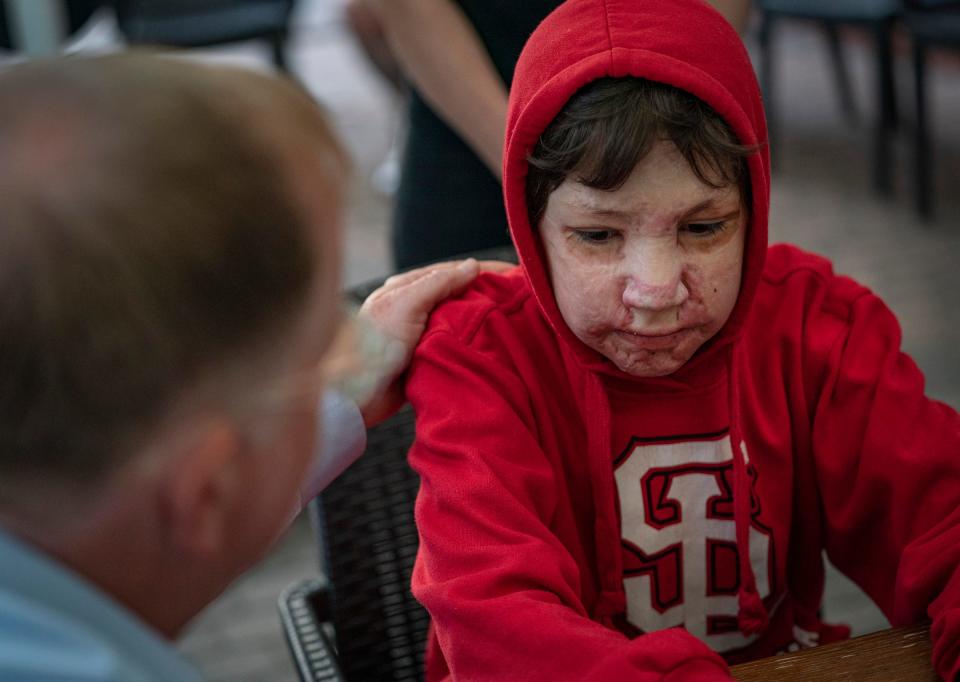
Kelley added: “To his surgeons’ credit, they saved his life. He has a face. But he’s a teenager. … Imagine the stigma. Surgically, he's unique because you see those scars and you expect them to be firm and hard, but they’re soft, almost boggy. Because of his social situation, we were very concerned. We want to build trust in him.
“Even though he has so many things that could (be improved with surgery), we do not want to betray his trust.”
The doctors met repeatedly with Maksim over the course of several days, and, on May 19, finally operated on both of his hands to improve his ability to open and close them and fully straighten his fingers.
“He is old enough. With kiddos, as soon as they're able to understand what you're talking about, they need to be invested in the plan,” Kelley said.
More: 'Where is the music?' Quiet of Poland perplexes burned 4-year-old from war-torn Ukraine
Yevchenko accompanied him to surgery, and said it was incredibly important that mental health support was in place for the children and their parents on this mission.
“It was organized with psychological help … because sharing their distress with other human beings affects their physical healing,” she said. “Everything is connected.
“Especially when it comes to teenagers, it is important to work with their anxiety related to other people’s perception of how they look, how others judge their appearance, which is very normal in this age group, regardless of the condition. If they received any psychological help during their treatment here, we should perceive it as a seed — it will grow with time.”
And it did.
On the last day he was in Poland, Maksim took down his hood for a while. He talked with other kids, and he even smiled once or twice.
When the American doctors return to Poland or Ukraine in a year for the next medical mission, Maksim told them he’d consider a bigger operation, one that could help improve the scars on his face.
A parent's emotional scars
Tears spilled down Nina Nykanorova’s cheeks on the morning of May 18 as she described the accident that burned her son, Artem, when he was just 13 months old.
“I wanted to prepare tea for the family,” she said, despair deepening the lines in her face. “It was the same year his father died. I was down and confused and in distress due to his death at that time. … I looked away for a moment and my son pulled a kettle of water on himself.”
The boiling water scalded his chest, left arm and hand.
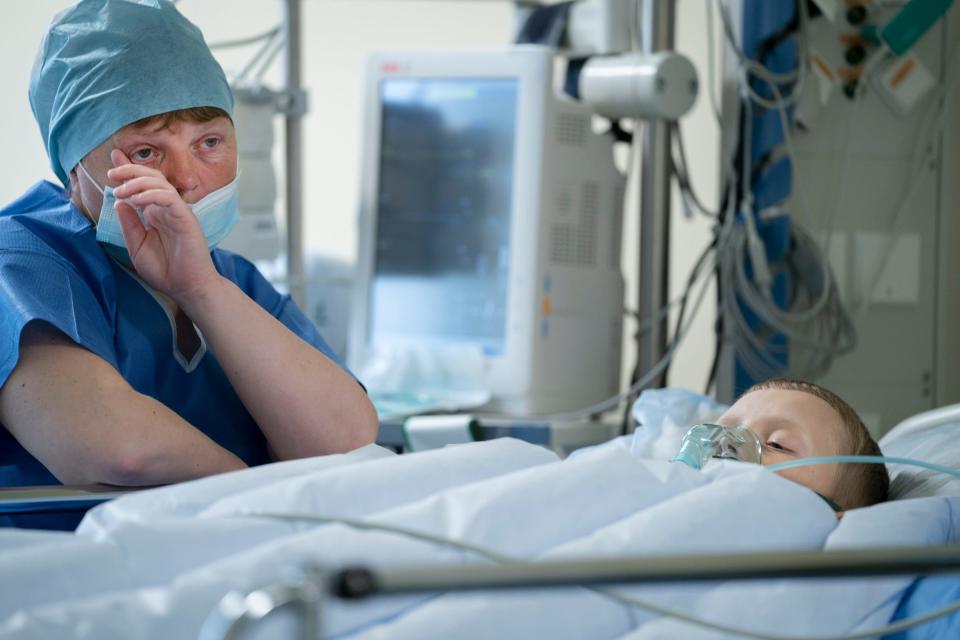
As Artem has grown, the burn scars have thickened and contracted, making it too hard for him to play on the horizontal bars at the playground or ride a bicycle. He is now 13, and needed surgery to help improve mobility in his left arm and hand.
More: She was badly burned taking a selfie, then became a war refugee. Now US doctors are helping her.
That morning, Nykanorova, 35, who lives in the Volyn Oblast, in the northwestern part of the country, near the border with Belarus, waited in an empty hospital room for her son to come out of surgery.
“I am worried,” she said, “like any mother’s heart would worry.”
Her new friend, Olena Katasova, offered comfort in the form of a hug.
A reprieve from the worries of war
Katasova’s child, Mariia Ovdiienko, also was in an operating room on the hospital’s third floor.
Mariia, 16, was born with syndactyly, a congenital condition, and was undergoing surgery to separate and straighten fused fingers on her left hand and the toes on her right foot.
“She wasn’t approved for an operation in Kyiv,” said Katasova, who lives near the capital city in a village called Borodyanka. “So we made peace with her condition and accepted that she would live with her fingers like this. This opportunity was unexpected.”
The trip to Poland, Katasova said, brought hope for improvement in Mariia’s hand and foot, but also a reprieve from the worries of war.
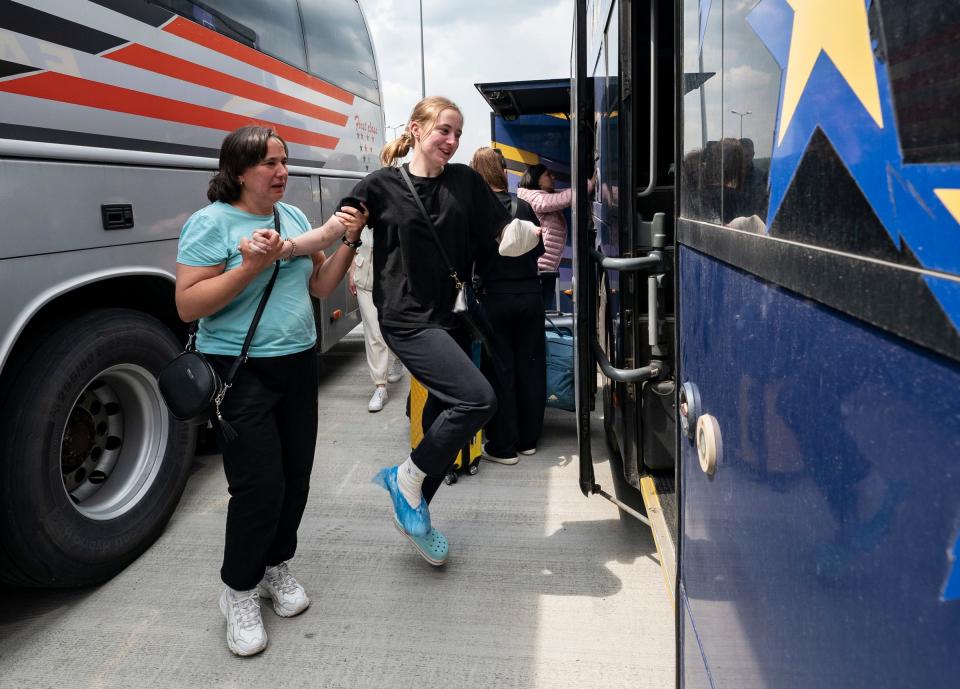
When Russia invaded in February 2022, “we were under occupation for a month,” she said. “We didn’t have electricity for two months. There were tanks next to our windows. We stayed in our cellar for three weeks.”
She considered fleeing the area, she said, moving west, but “it was already too late. Russians were everywhere, walking the streets of our small village and bombing Borodyanka.
“Kyiv was bombed from our area … so we couldn’t leave. They entered Borodyanka on the second day of the war.”
Since then, her town and nearby Kyiv have been reclaimed by Ukrainian forces, but the violence continues.
“Today, Kyiv was bombed again,” she said. “And we are supposed to go back there? I am worried.”
It was Katasova’s turn for tears as she described the gratitude she feels for the American doctors who came to help her daughter, to the U.S. government for military support as well as to the Polish people for their solidarity with Ukraine.
'We decided we wouldn’t wait around to have our house hit'
Since the Russian invasion, Poland has hosted more Ukrainian refugees than any other country, according to the United Nations High Commissioner for Refugees. More than 1.6 million Ukrainians have registered for temporary protection or social services in Poland since February 2022.
Among them is Svietlana Yehorushkova, 47, who now works at the Polish hospital where the children were treated, helping with translations and logistical support.
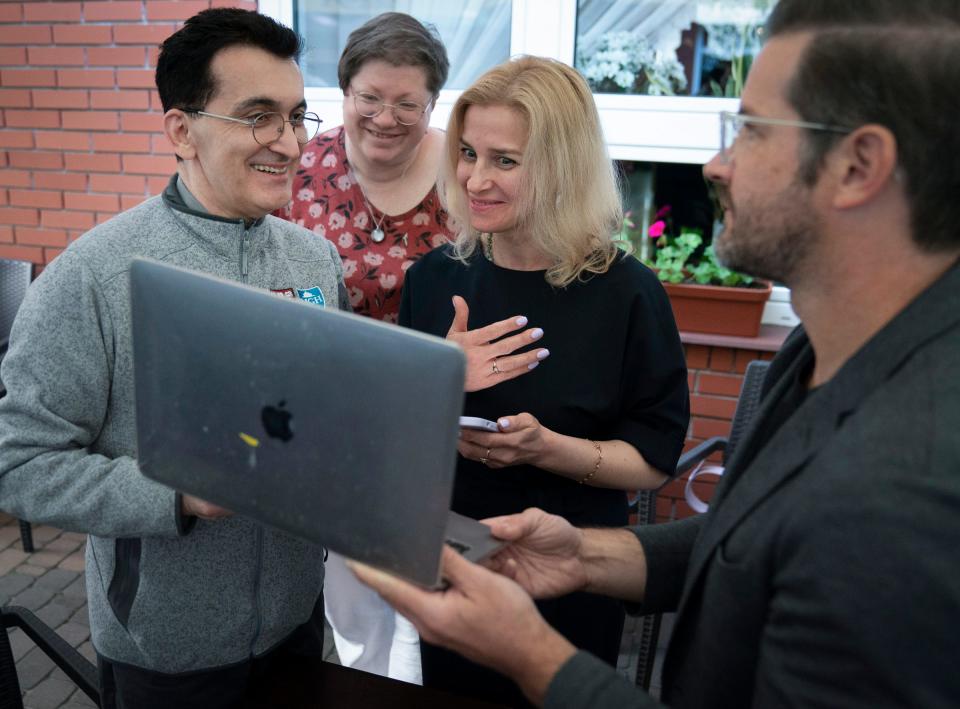
She fled from her home in Irpin, Ukraine, on March 13, 2022, with her daughter, mother and dog.
“We decided to leave after particularly strong shelling,” Yehorushkova said. “Our house wasn’t damaged, but others were seriously damaged and missiles were flying right above our roof. We were between Ukrainian and Russian soldiers.
“We decided we wouldn’t wait around to have our house hit. So we left … and do not tempt fate.”
Though she’s trained as a psychologist, she doesn’t yet have a license to practice in Poland. So she does other work at the hospital for now.
Her hope is to remain in the country for a few more years.
“My daughter really would like to enroll in technical school here,” Yehorushkova said. “I like it here in Poland.”
So does Ludmila Arshulik.
A nurse at the hospital, Arshulik, 40, moved to Poland three years ago, following her daughter, who came to study at one of the universities.
“When the war started, I helped at the border,” she said. “I cooked some food for the refugees, invited them to my house, picked them up from the border and transported them.”
During the medical mission in mid-May, she worked with many of the children from her native country, helping during their surgeries.
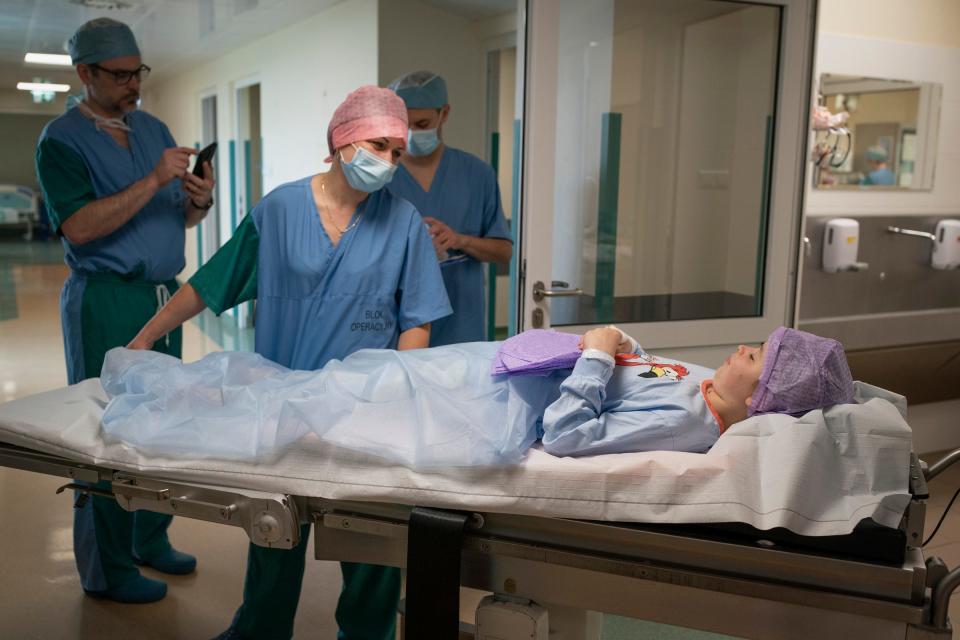
“When I see them here, I think about how many such children are in Ukraine or in occupied territories,” Arshulik said. “My cousins live in an occupied territory, so more or less I am aware of what is going on there. It is difficult to leave these territories now.”
Those who try, she said, “might end up in Siberia, not Poland.”
When she visited her mother and extended family last year, she tried to persuade them to return to Poland with her.
“I didn’t succeed,” she said. “My mother’s mother wouldn’t leave her home. My sister’s husband is a soldier. He is fighting, so my sister doesn’t want to abandon him. As a result, my mother also doesn’t want to leave them behind. She said: ‘I don’t have a big enough suitcase to pack everyone in it.’ “
The return to Ukraine
On a sunny Saturday morning in late May, all of the children’s surgeries were complete. Only 16-year-old Karolina Petrenko, a Ukrainian refugee living in Warsaw, remained in the hospital, recovering from operations on her hands, arms and neck. She’d remain in hospitalized several more days.
More than a dozen families — those who were not living in Poland or other European countries with refugee status — gathered in the lobby of the Secession Hotel with their bags, waiting for the bus that would take them to the border.
Mariia Ovdiienko’s left hand and right foot were bandaged and she struggled to get around on a crutch using just one hand.
She leaned on Egor Dikhtiaruk, 17, who in the span of a week had become her boyfriend. He wore a neck brace following his surgery. They posed together for a picture with other friends they’d made on the trip to Poland.
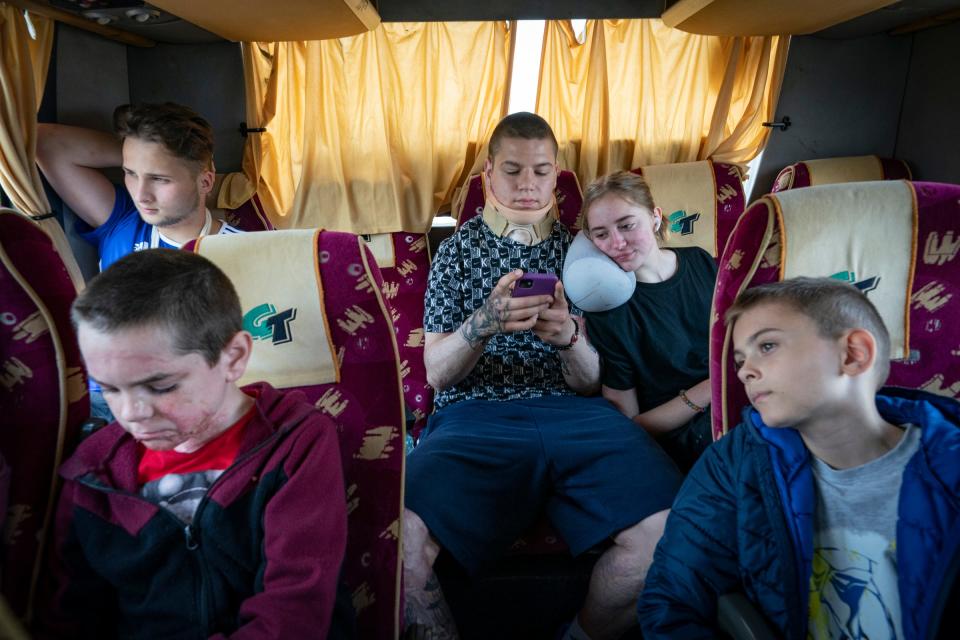
When the bus pulled up, Yevchenko helped 6-year-old Evheniia Ukhvatova climb the steps. She’d had surgery on the burn scars covering her feet and legs earlier in the week. Her 75-year-old great grandmother, Valentina Ukhvatova, got on board, too.
Though a few of the older kids piled in together at the back of the bus, many of the younger children sat beside their mothers.
“What I see particularly distinctively in this group is that … the children are strong in spirit, and they help their parents, support them,” Yevchenko said.
“Part of my job is to prepare them to go back to Ukraine. What awaits them there despite ongoing war is a long recovery and further treatment. They are very happy they had operations here and didn’t expect that in such a short time, they would be able to see the results. They have many questions and worry about whether it is possible to maintain the results.”
Dr. Artem Posunko and Dr. Eduard Polianin, both physicians in Dnipro, Ukraine, accompanied them on the 24-hour journey home.
“We have medicine, painkillers, dressings for the wounds,” Polianin said. “They must be stable before traveling. That’s why we had a specific schedule for the operations; those whose procedures were more complex were earlier in the week.”
Posunko loaded luggage into a compartment beneath the massive white bus and then boarded himself.
“I have a sense or a feeling that these kids are my kids,” Posunko said.
A few minutes later, they were off.
Applause and cheers broke out as the bus passed the hospital where the children had surgery.
They continued on, past the rolling yellow rapeseed fields, toward the Ukrainian border and an uncertain future.
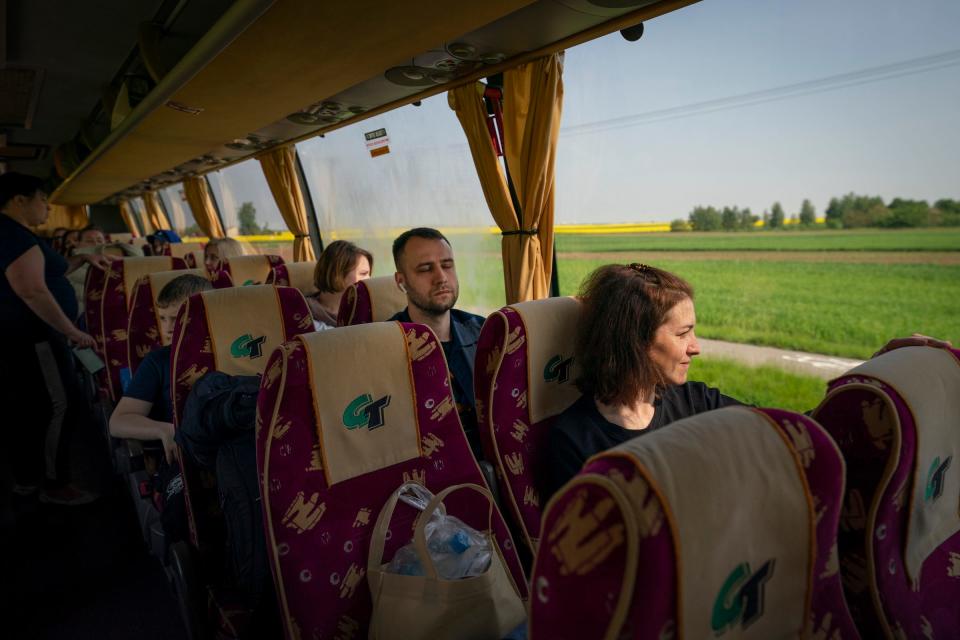
When they arrived at the dividing line between their countries in Hrebenne, Poland, the entire group had to get off the bus, unload their bags and transfer to a purple bus headed for Lviv.
Yevchenko said support for these families won’t end when they arrive home.
“Ukraine’s future depends on the psychological state of Ukrainians, children in particular,” she said. “For now, there is a common enemy we fight, and we have no choice. But when the peace comes — hopefully sooner rather than later — many people may face stages of depression and apathy.
“I feel it is my duty to support them in finding psychological professionals near their homes who they could turn to if they need help,” she said.
Zuza Nikitorowicz translated interviews for this article.
Contact Kristen Shamus: kshamus@freepress.com. Follow her on Twitter @kristenshamus.
This article originally appeared on Detroit Free Press: Burned Ukrainian kids go home, lifted by US docs' help and new friends

